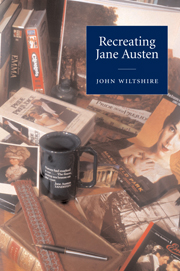Book contents
- Frontmatter
- Contents
- Preface and acknowledgments
- A note on texts
- Introduction: ‘Jane Austen’ and Jane Austen
- 1 Imagining Jane Austen's life
- 2 Recreating Jane Austen: Jane Austen in Manhattan, Metropolitan, Clueless
- 3 An Englishwoman's constitution: Jane Austen and Shakespeare
- 4 From drama, to novel, to film: inwardness in Mansfield Park and Persuasion
- 5 Pride and Prejudice, love and recognition
- 6 The genius and the facilitating environment
- Notes
- A note on films cited
- Bibliography
- Index
4 - From drama, to novel, to film: inwardness in Mansfield Park and Persuasion
Published online by Cambridge University Press: 22 September 2009
- Frontmatter
- Contents
- Preface and acknowledgments
- A note on texts
- Introduction: ‘Jane Austen’ and Jane Austen
- 1 Imagining Jane Austen's life
- 2 Recreating Jane Austen: Jane Austen in Manhattan, Metropolitan, Clueless
- 3 An Englishwoman's constitution: Jane Austen and Shakespeare
- 4 From drama, to novel, to film: inwardness in Mansfield Park and Persuasion
- 5 Pride and Prejudice, love and recognition
- 6 The genius and the facilitating environment
- Notes
- A note on films cited
- Bibliography
- Index
Summary
The advantage of the cinema over the theatre is not that you can even have horses, but that you can stare closer into a man's eyes.
Grigory Kozintsev, ‘King Lear’, the Space of TragedyThe example of Frances Burney, though, was of more immediate importance to Jane Austen than Shakespeare. There is a scene in Burney's third novel Camilla in which the youthful heroine learns that her beautiful but trivial cousin Indiana is engaged to Edgar Mandlebert, the young man whom at the end of the novel, after many misunderstandings, she is eventually to marry. What she overhears brings with it ‘a consciousness too strong for any further self-disguise’, the revelation that she herself is in love with him. ‘The sound alone of the union struck as a dagger at her heart’, Burney writes, ‘and told her, incontrovertibly, who was its master’. Camilla, as is the habit of Burney's heroines, registers the impact of this revelation on her body, in this case as illness. ‘Her sensations were now most painful: she grew pale, she became sick.’ ‘Strangely disordered,’ but ‘no longer self-deceived’, she staggers back to the carriage where she laments, ‘in a new burst of sorrow, her unhappy fate, and unpropitious attachment’. But Camilla is a good girl and it is not long before she stops weeping and pulls herself together. ‘Her regret was succeeded by a summons upon propriety.’
- Type
- Chapter
- Information
- Recreating Jane Austen , pp. 77 - 98Publisher: Cambridge University PressPrint publication year: 2001
- 1
- Cited by

